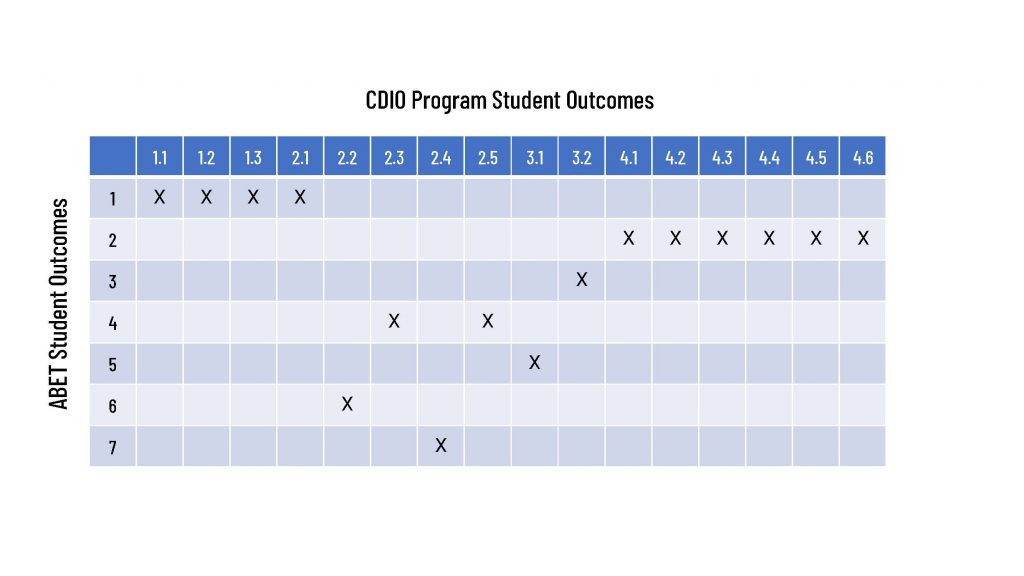Objectives & Outcomes

Program Educational Objectives for Course 16 and Course 16-ENG
The educational program objectives of our undergraduate degree programs are in alignment with the missions of MIT, the School of Engineering, and the Department of Aeronautics and Astronautics. The educational program objectives were updated in spring 2019 as part of the Department’s regular, ongoing review of its curriculum and educational objectives.
The educational objectives of our undergraduate degree programs, Course 16 and Course 16-ENG, are that within a few years of graduation, a majority of our graduates will have completed or been progressing through top graduate programs; be advancing in leadership tracks in industry, non-profit organizations, or the public sector; or pursuing entrepreneurial ventures.
In these roles, they will:
- Apply a deep working knowledge of technical fundamentals to solve engineering problems and address society’s needs in aerospace and related areas for the nation and the world.
- Understand technical, business, societal, and other contexts; demonstrate a commitment to ethical action; and continue to strengthen technical, professional, and personal skills.
- Communicate and collaborate effectively as members of multidisciplinary teams.
- Lead in the conception, design, implementation, and operation of innovative technologies, products, processes, and systems in aerospace and related areas for the nation and the world.
Student Outcomes for Course 16 and Course 16-ENG
By the time our students complete their programs, they will have attained the following standard ABET student outcomes:
- an ability to identify, formulate, and solve complex engineering problems by applying principles of engineering, science, and mathematics
- an ability to apply engineering design to produce solutions that meet specified needs with consideration of public health, safety, and welfare, as well as global, cultural, social, environmental, and economic factors
- an ability to communicate effectively with a range of audiences
- an ability to recognize ethical and professional responsibilities in engineering situations and make informed
- an ability to function effectively on a team whose members together provide leadership, create a collaborative and inclusive environment, establish goals, plan tasks, and meet objectives
- an ability to develop and conduct appropriate experimentation, analyze and interpret data, and use engineering judgment to draw conclusions
- an ability to acquire and apply new knowledge as needed, using appropriate learning strategies
Our student outcomes are implemented through the following four broad categories that adhere to the CDIO syllabus:
- Disciplinary Knowledge and Reasoning
- Personal and Professional Skills and Attributes
- Interpersonal Skills: Teamwork and Communication
- Conceive, Design, Implement, and Operate Systems
The Department’s CDIO student outcomes for Course 16 and Course 16-ENG are very similar and vary only for outcomes 1.1-1.3; student outcomes 2.1. – 4.6. are the same for both courses.
At the time of graduation, students in Course 16 and Course 16-ENG will be able to:
1. Disciplinary Knowledge and Reasoning (Course 16)
Course 16
1.1. Apply the principles of the underlying mathematics (including probability and statistics), physics, chemistry, and biology.
1.2. Apply the principles of core engineering fundamentals in aerospace systems, solid mechanics and materials, signals and systems, fluid dynamics and aerodynamics, thermodynamics and propulsion, computation, dynamics, and controls.
1.3. Demonstrate deep working knowledge of professional engineering in at least four of the following topics: aerodynamics, structural mechanics, feedback control systems, real-time systems and software, digital systems, communication systems and networks, human systems engineering, autonomous systems, propulsion systems, computational modeling and data analysis.
Course 16-Eng
1.1. Apply the principles of the underlying mathematics, physics, chemistry, and biology.
1.2. Apply the principles of core engineering fundamentals in aerospace systems, solid mechanics and materials, signals and systems, fluid dynamics and aerodynamics, thermodynamics and propulsion, computation, and one of either dynamics or controls.
1.3. Develop a (i) deeper level of understanding and skill in a field of engineering that is relevant to multiple disciplinary areas (e.g., autonomous systems, computational engineering, mechanics, or engineering management), or (ii) a greater understanding and skill in an interdisciplinary area (e.g. energy, environment and sustainability, or transportation).
2. Personal and Professional Skills and Attributes (Course 16 and Course 16-ENG)
2.1. Identify, formulate, and solve complex engineering problems employing appropriate models and considering uncertainty.
2.2. Develop and conduct appropriate experimentation, analyze and interpret data, and draw conclusions based on the results.
2.3. Think holistically and systemically including recognition of competing factors among components and disciplines, and contexts (e.g. technical, business, societal, etc.)
2.4. Demonstrate personal skills that contribute to successful engineering practice including initiative, creativity, critical thinking, time management, independent learning, and metacognition.
2.5. Demonstrate an understanding of ethical and professional responsibilities.
3. Interpersonal Skills: Teamwork and Communication (Course 16 and Course 16-ENG)
3.1. Lead and work in effective and inclusive teams.
3.2. Communicate effectively with a range of audiences.
4. Conceive, Design, Implement, and Operate Systems (Course 16 and 16-ENG)
4.1. Recognize the impact of various contexts in engineering design including technical, business, and societal (e.g. cultural, environmental, public health, safety, etc.) contexts.
4.2. Appreciate differences of enterprise cultures, missions, and strategies and work successfully in organizations.
4.3. Conceive engineering systems including an understanding of requirements, system modeling, and project management.
4.4. Design complex systems to meet specific needs.
4.5. Implement hardware and software processes and manage implementation procedures.
4.6. Operate complex systems and processes and manage operations.
Mapping between ABET and CDIO Student Outcomes
